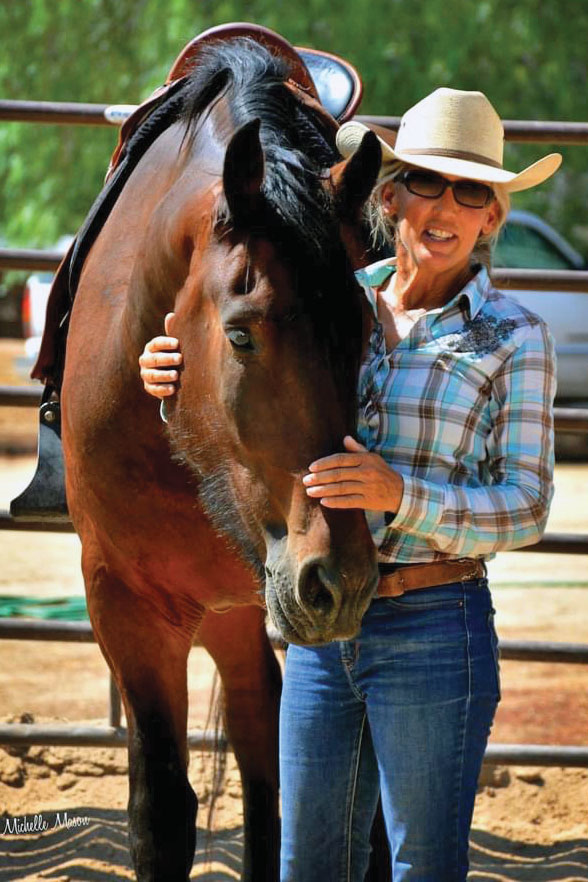By Sheryl Lynde | Horsetrader columnist
In my previous article, I wrote about motivated reasoning – that is, “being emotionally attached to an outcome” despite adverse consequences to that outcome or belief.
Emotions form our beliefs – either consciously or subconsciously. We know those beliefs well. We have constructed our identity around them, and they feel comfortable to us. Being confronted with opposing ideas can shake up what we have known to be true for most of our lives. We can feel unnerved or closed by that — which spawns feelings of anxiety, a loss of control over the possibility of our identify being challenged. Or, we can hold onto our beliefs with loose reins and be open to adopting new ideas and new beliefs.

Awareness of our emotions is the true path to knowing ourselves and becoming authentic. Peter Scazzero, author of Emotionally Healthy Spirituality wrote, “we can’t reflect and respond effectively to our emotions if we don’t know what they are. Our bodies feel our emotions before our minds. We often lie to ourselves and deny emotions we are feeling because they make us feel uncomfortable. Emotions trigger sensations that course through our body such as, pride, frustration, envy, jealousy, anger, shame, guilt, etc. These are real, your body is sending you signals, it’s communicating the need for awareness at that moment.”
So where am I going with this, and what has it got to do with horses? Everything — stay with me!
A horse is brought to me for training to either resolve an issue or get started. Training has progressed to the point where it is time for the owner to ride. Do you think that the horse will respond to each of us identically? No, not usually. And why?… ability or knowledge? Not necessarily. More likely, it is due to the fact that we have different beliefs which in turn are due to different emotions.
If the owner was involved in an accident or near-accident with the horse, it is likely they are experiencing a lack of trust, fear and anxiety even though they may say they are not. I have seen many a rider deny their fear, yet I have observed their hands shaking as they try to mount. But denying an emotion for whatever reason will not eliminate the existence of the emotion. It hides in the body and makes its presence known through certain triggers. Deny as you might, the body reveals what you are feeling.
As the trainer, I do not share in those emotions because I was not involved in — nor was I a witness to — whatever incident landed the horse at my facility. The horse I see and have been training is not the horse the owner was riding. My emotions are on the other side of the spectrum. When the horse arrived, I may have witnessed a reactive, fearful horse but after his issues were addressed through an appropriate training program, I am able to see a noticeable change. I have seen his fear superseded with a more confident demeanor, and his reactive behavior exchanged for a better decision-making process — such as spook in place versus bolt.
Because of the horse’s ability to make significant changes in his behavior, amazement overwhelms me as he sheds his previous persona like a winter coat he no longer needs. I see a slate wiped clean. His new demeanor triggers feelings of admiration and those emotions course through my entire body and extend through my voice as I speak to him — or with my hands as I guide him and my legs as I ride him. We trust each other and it is an undeniable yet unseen exchange.
The owner, though, may still see visions of the incident, and the fear and anxiety is ever present. They don’t trust the change their horse has made to be an honest lasting change. So, do you think there will be a difference between my ride and the owner’s ride? Absolutely!
Then, add to the above scenario the different skill level and you have a different horse with each rider. Now, I am not a proponent of positive thinking — I am an advocate of awareness. According to Peter Scazzero, when anxiety is triggered by a negative emotion such as fear, the resulting behavior is distraction and avoidance. When anxiety perpetually gets negatively reinforced, it becomes a habit.
This is not the most optimum space to learn new skills, since knowledge is progressively acquired. What to do? Research shows that the practice of being mindful of your emotions and aware of how your negative habits become ingrained, this consistent work has reduced levels of anxiety by 60 percent. This takes work. Putting your foot in the stirrup is voluntary. Dismounting is mandatory.
Although safe landings look effortless, they are orchestrated through hours of practice, preparation — and awareness.
–Sheryl
Leave a Comment
All fields must be filled in to leave a message.